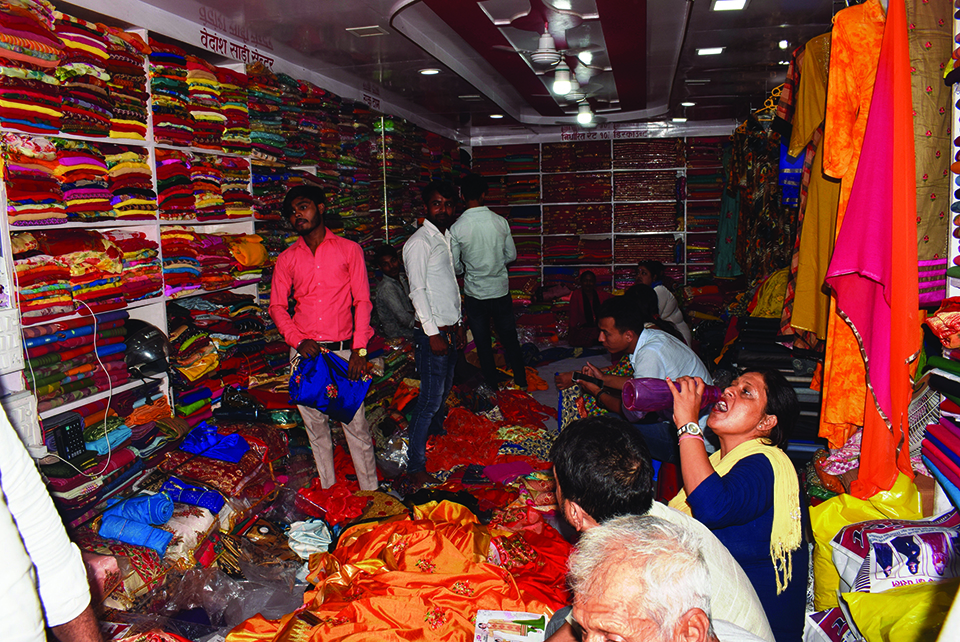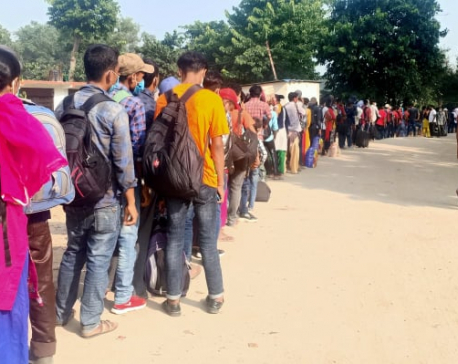
OR
Indian border markets chock-a-block with Nepali Dashain shoppers
Published On: October 11, 2018 07:50 AM NPT By: MOHAMMAD HABIB

BHAIRAHAWA, Oct 11: Once again, the Indian markets are jam-packed with Nepalis. Because of the Dashain festival, people from the border areas and even remote towns and villages of Nepal are making trips to their nearest Indian market across the border. 'Low price and better quality' pulls them to the 'other's land'.
"It is a matter of price. Here in Nepali market, you cannot buy bed sheets, shirts, pants at that prize. I mean, you can get Chinese clothes, but Indian brands are different," said Keshab Sharma of Butwal, who was heading to Sunauli market. "Basically, saris and other women's wear are cheaper in India," he added.
Saris are expensive in our country. If you look for quality, it costs over Rs 5000, Sharma noted. “But in Indian markets, you can buy dress for everyone in the family with that amount.”
Indian border-side markets do brisk business during festival seasons in Nepal. Nepali consumers claim that they prefer to go shopping across the border because of better quality and cheaper rates.
Shopping in markets across the border is not a Dashain affair. Be it small or big festival, crowd throng these markets. And the reason is the same, the lower prices. “People go to Indian markets in Chhat, Id, Dashain, Tihar and other festivals for shopping, it has become a kind of culture or practice," Sharma stated.
For the people of Butwal, Palpa, Arghakhachi, Nawalparasi and Kapilbastu, Indian markets feel like 'their own'. If shopping is big, people come even from far away places, according to Sharma.
"For instance, let's say there is a wedding ceremony or some other function in your family, or whenever you need to buy something in huge quantity, you feel that it is better to buy those from India. As our lifestyle and cultures are similar, their products work for us," Sharma remarked.
During Dashain, along with clothes and edibles demand for home appliances is also massive. According to Sharma, considering the massive crowd of Nepali costumers during festive seasons, Indian shops offer bumper discounts on prizes along with other schemes that focus specially on Nepali customers.
"Dashain is different in Nepal than in India. We are gripped by Dashain fever from much earlier while it is not so on the other side. They launch several marketing packages that are specially targeted for Nepali customers," said Sharma. "Nepalis are also used of taking advantage of such offers,” he added.
From Fulpati, people generally stay at home and engage in rituals and family visit. While some continue shopping even after that, most of the families prefer to do it well before that. According to Sharma, the crowd is much thicker nowadays. "Most of the people do shopping between Ghatasthapana to Fulpati," he said.
Markets in Sunauli, Nautanawa, Kakarhawa, and Bhagwanpur do brisk business during Nepali festival. On the other hand, Nepali markets are mostly dry during the festival season, he said.
Anita Rana, a local of Resunga Municipality of Gulmi, who was in Bhairahawa for some other purpose, said that she feels it is wise to do shopping while she is in Bharahawa. She said she would buy some saris and dress for her siblings from Sunauli. "In Sunauli market, things are far cheaper than in our markets. I came here for some other work but since I'm already here, why not do some shopping for Dashain?" she chuckled.
Mahesh Singh, a businessperson based in Sunauli, India was elated while reporting that his business is all time high from Dashain till Tihar. "It is hard to manage things during this festival," he said. "No matter how much I try to handle, it is something that always remains still unmanaged. I think I would have even better business if I could manage it further," he added.
Singh sells branded and normal quality saris and kurtas. “Women complain a lot when it comes to quality and their preferences for saris and kurtas,” he shared adding that, "I keep a lot of varieties, to keep my lady customers happy. Costumers are our gods," he maintained. He added that a huge portion of his profit comes from Nepali customers during the Dashain festival.
Shyam Madhesiya of Sunauli, who has been selling clothes since the last five years, also shared similar assessment. He stated that Nepali costumers from hills and nearby tarai region visit his shop for shopping. "It is not just the people of the plains, but also from far away remote areas in the hills of Nepal, come to my shop. I have regular costumers from hilly districts, they come here every Dashain," he reported.
Even though Nepalis spend a lot in Dashain, the revenue hardly goes to the pocket of the government. Since, they come back from the border with stuffs in small bags and suitcase, it is not 'practical' to 'interrogate' these shoppers, custom officials say.
As per existing customs regulation, purchase over Rs 1000 is taxable. However, in practice this is not implemented strictly. Still some locals complain that they face hassles at the border from custom officials.
A Nepali businessman, based in Bharahawa, Kapil Kafle lamented that Nepalis go to India 'out of habit' and not because they get goods in cheaper rates. "There are lots of stuffs that they get in reasonable rates right here. Only a few things might be cheaper there, but Nepalis have habit of going to Indian markets," he said. "Sometimes, they pay even higher rates for the same good in Indian market, yet they are happy to buy it there," he added.
You May Like This

SC directs govt to seek diplomatic resolution to Nepal-India border dispute
KATHMANDU, Sept 15: The Supreme Court (SC) has issued a directive urging the government to seek a diplomatic resolution to... Read More...

Govt decides to close down border with India until Nov 15 to contain the spread of COVID-19
KATHMANDU, Oct 13: The government has decided to close Nepal’s international border with India until November 15 in view of... Read More...











Just In
- Bangladesh protest leaders taken from hospital by police
- Challenges Confronting the New Coalition
- NRB introduces cautiously flexible measures to address ongoing slowdown in various economic sectors
- Forced Covid-19 cremations: is it too late for redemption?
- NRB to provide collateral-free loans to foreign employment seekers
- NEB to publish Grade 12 results next week
- Body handover begins; Relatives remain dissatisfied with insurance, compensation amount
- NC defers its plan to join Koshi govt







Leave A Comment